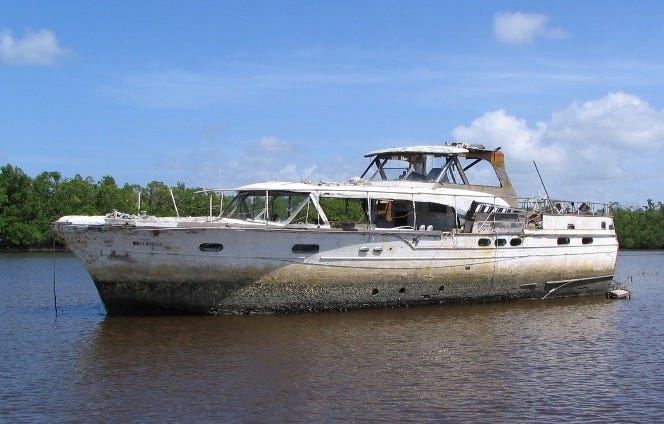A Permit for 'Long Time' Anchoring in Florida
To Sit in One Place for More Than Two Weeks, Effective in January

As reported here last week, North Carolina is looking at a dubious 10-day limit on anchoring, while Florida has just approved something similar, which will go into effect six months from now.
Passed unanimously in both the house and senate, Senate Bill 164 was signed into law by Governor Ron DeSantis on June 19.
Among other things, the bill requires owners to obtain a permit if they intend to anchor in the same spot for 14 days or more within a 30-day period. The permit would apply to the area within one nautical mile of “a documented anchorage point.”
Presumably, a cruiser who upped anchor on day 13 and moved at least a nautical mile further along would not need a permit to re-anchor, as the clock would be reset by that act of navigation. This flexibility is a key difference between the Florida law and the North Carolina proposal.
Senate Bill 505 would forbid any vessel from anchoring more than 10 days within a 30-day period even if the vessel in question anchored in a different spot every night while in North Carolina—no matter how much ground had been covered in between.
Florida’s permiting system goes into effect on January 1, 2026 and will be administered by state Fish & Wildlife officers. Officers can revoke a permit it they determine that the vessel in question is derelict, at risk of becoming derelict or violating marine sanitation regulations.
The permits are referred to as “long time anchoring permits,” and boat owners will be able to obtain them online for free.
Anyone “who engages in long-term anchoring without a valid permit” can be cited for committing a noncriminal infraction like a typical speeding ticket. A first offender can be fined up to $100. Repeat offenders may be fined up to $500.
SB 164 also prohibits anyone from living aboard a boat that has been deemed derelict, as defined here.
It establishes harsher penalties for repeat derelict-vessel offenders: a first-degree misdemeanor for a first offense, a third degree felony for second offense and a third-degree felony for a third offense. That last one can result in up to five years in jail and a $5,000 fine.
Also in SB 164:
For vessels at risk of becoming derelict, the bill provides that if the owner or operator is present on the vessel, a law enforcement officer can immediately conduct a test of the vessel’s effective means of propulsion for safe navigation. The bill provides that a vessel will be declared a public nuisance if it is found to be at risk of becoming derelict three times within a 24-month period.
The propulsion test is a seatrial in which the boat must travel 100 yards under her own power, turn around and return to the starting point, while being observed by marine police.
Sections of the new law, other than the anchoring-permit requirement, went into effect on July 1.
Florida Fish & Wildlife has estimated that there were 1,000 derelict or “at risk” vessels in Florida waters at the beginning of 2025.




Ah yes the “free” state of Florida with yet another tax via permit
It is a fair statute to help monitor derelict boats and help law enforcement be proactively engaged. Derelict boats are a hazard to responsible boaters and the environment.